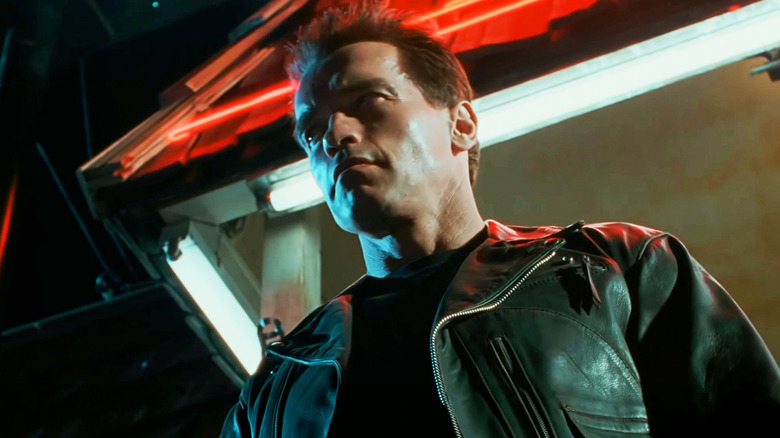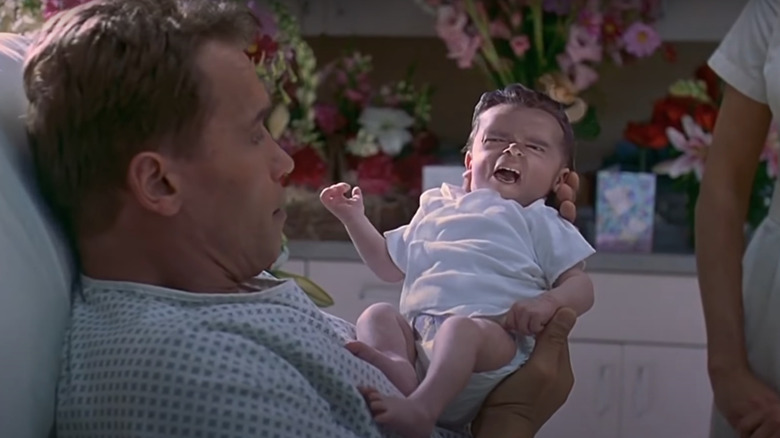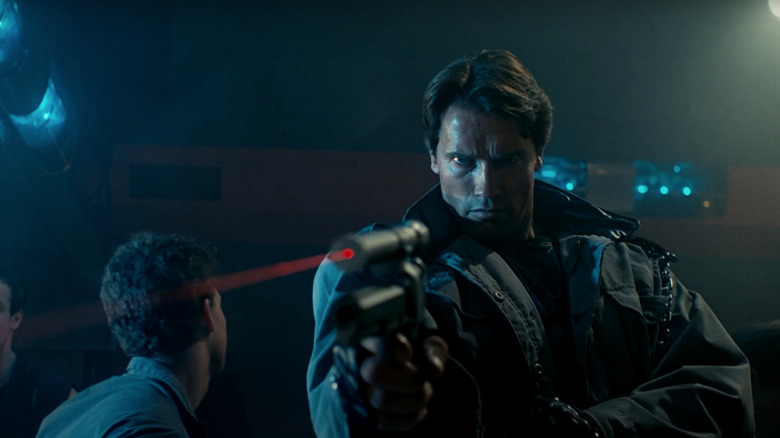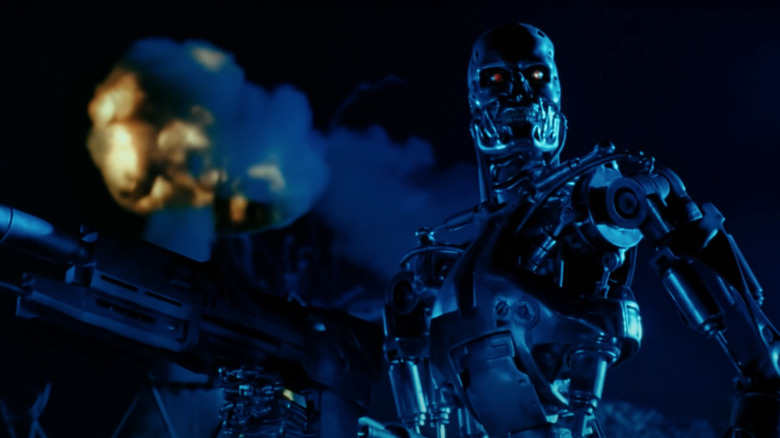Arnold Schwarzenegger Broke His Own Sequel Rule To Star In Terminator 2
One of the only good things to come out of Hollywood's obsession with grinding a good thing into the ground via unrelenting sequels are some of the titles. Whether characters are getting "back in the habit" or "dying harder," there's nothing better than a bonkers sequel subtitle. And while a subtitle isn't necessarily indicative of a film being good or bad, Hollywood has certainly churned out its share of sequels that truly didn't need to happen. Does anyone remember "Son Of The Mask" or "Jaws: The Revenge?" Hell, 20th Century Fox even greenlit "Elektra," a sequel to 2003's universally panned "Daredevil," just because the first movie made an okay profit despite being arguably one of the worst superhero movies ever made.
Over the years, and especially, in our nostalgia-obsessed present moment, we've been treated to all-manner of legacy sequel — some good, some terrible — as Hollywood increasingly turns to existing IPs and familiar characters to attract viewers. But sometimes, just sometimes, sequels can live up to and even surpass their predecessors. We've seen it with Sam Raimi's "Spider-Man 2," Francis Ford Coppola's "The Godfather Part II," and James Cameron's "Terminator 2: Judgment Day."
In fact, Cameron has a knack for making sequels that are equal to, or better than, the original movies. He did it with "Aliens" in 1986, again with his "Terminator" follow-up in 1991, and just proved he really is the king of the box office with "Avatar: The Way Of Water." This might be why "Terminator" star Arnold Schwarzenegger was willing to break his long-standing rule of staying away from sequels when it came to "T2."
'Sometimes they really screw it up bad'
For a man who's starred in "Junior" and "Batman & Robin," Arnold Schwarzenegger has some surprisingly discerning taste when it comes to picking his films. Despite appearing in a multitude of sequels throughout his decades-long career, the former Mr. Olympia has maintained a healthy distrust of the sequel as a concept.
As recently as 2015, he could be found saying as much publicly, during a Q&A for "Terminator Genisys":
"The sad story is that sometimes studios do a great job at creating sequels, and sometimes they really screw it up bad. And it all has to do with greed. They sometimes want to do it really cheap and make as much money as possible, so they don't hire the right cast, or the right director because it maybe costs them an extra billion dollars, so they want to do it really cheap. And other times they want to rush it, because they want to have it come out next spring, even though now it's already fall."
Fortunately, none of that was the case with James Cameron's early '90s "Terminator" follow-up. Almost a legacy sequel itself, coming out a full six years after 1984's "Terminator," "Terminator 2: Judgment Day" is, I think, the finest sequel ever made. Cameron was given all the money he needed to make his behemoth of a blockbuster, with "T2" seemingly benefitting from an ever-expanding budget, the total of which remains a point of contention even to this day — though likely ending up in the $100 million range. Luckily for its director, there were no issues securing Schwarzenegger's return, who willingly went against his own aversion to sequels so he could reprise his role as the titular cyborg.
Even in the '80s, Schwarzenegger didn't like sequels
For a time, James Cameron could do no wrong for independent production company Carolco Pictures. The now shuttered business agreed to acquire the rights to Spider-Man so the director could work on his famously unmade Spidey movie. That's unsurprising considering "Terminator 2" was the highest-grossing film of 1991 domestically, taking in $204 million at the box office and becoming Carolco's biggest hit.
And for Schwarzenegger, returning to the role that helped launch his career was a no-brainer, despite his aversion to sequels. As he said in a 1987 interview:
"We are putting together a second 'Terminator,' a sequel to that, which should be as good if not better than the first one. But usually I stay away from sequels because I don't want to really be known for building and making my career with sequels just to play it safe. And to go out and play to the same audience and so on. I like to take original ideas because there are some good original scripts out there. Like for instance 'Running Man,' I had the choice to do a sequel movie instead of that, and I was very very lucky that I chose 'Running Man' because that to me was a great script, a great concept and it really would move me a step further in my career."
"The Running Man" was a loose adaptation of the Stephen King novel and debuted the same year Schwarzenegger gave this interview. Unfortunately, King wasn't a fan of "The Running Man," and over time, its star seems to have soured on the project. But the principle of choosing original ideas over sequels was an admirable one for Schwarzenegger to uphold. It just so happened that James Cameron was a man he couldn't say no to.
We need more of the Arnie approach
While Arnold Schwarzenegger was devotedly trying to steer clear of sequels in the '80s, it seems the prospect of working with James Cameron again was too much to resist. As Arnie told GQ, he was taken in by Cameron's script for the sequel:
"Jim Cameron is just a genius writer because to come up with this idea to make the Terminator become a protector that hangs out with this kid, and because of that relationship he starts learning human behavior, how to be more cool, and how to high-five and how to say certain things [...] made it very, very precious [...] Here's Terminator all of a sudden not the killing machine, but a protector, what an interesting spin."
Clearly Schwarzenegger was able to recognize the talent of Cameron early on, and wisely broke his sequel rule to work with the director again. And with a script that truly innovated on the first movie while staying true to the original vision, "Terminator 2" was obviously destined to become a major success.
In an age when sequels, legacy sequels, and the general franchise-ification of movies is rife, Schwarzenegger's mid-80s aversion to sequels is a refreshing reminder of the importance of championing original ideas. With the era of the cinematic universe, Marvel's in particular, seemingly hitting somewhat of a nadir in recent years, we'd do well to see major stars take a similar approach to Arnie in 2023.



